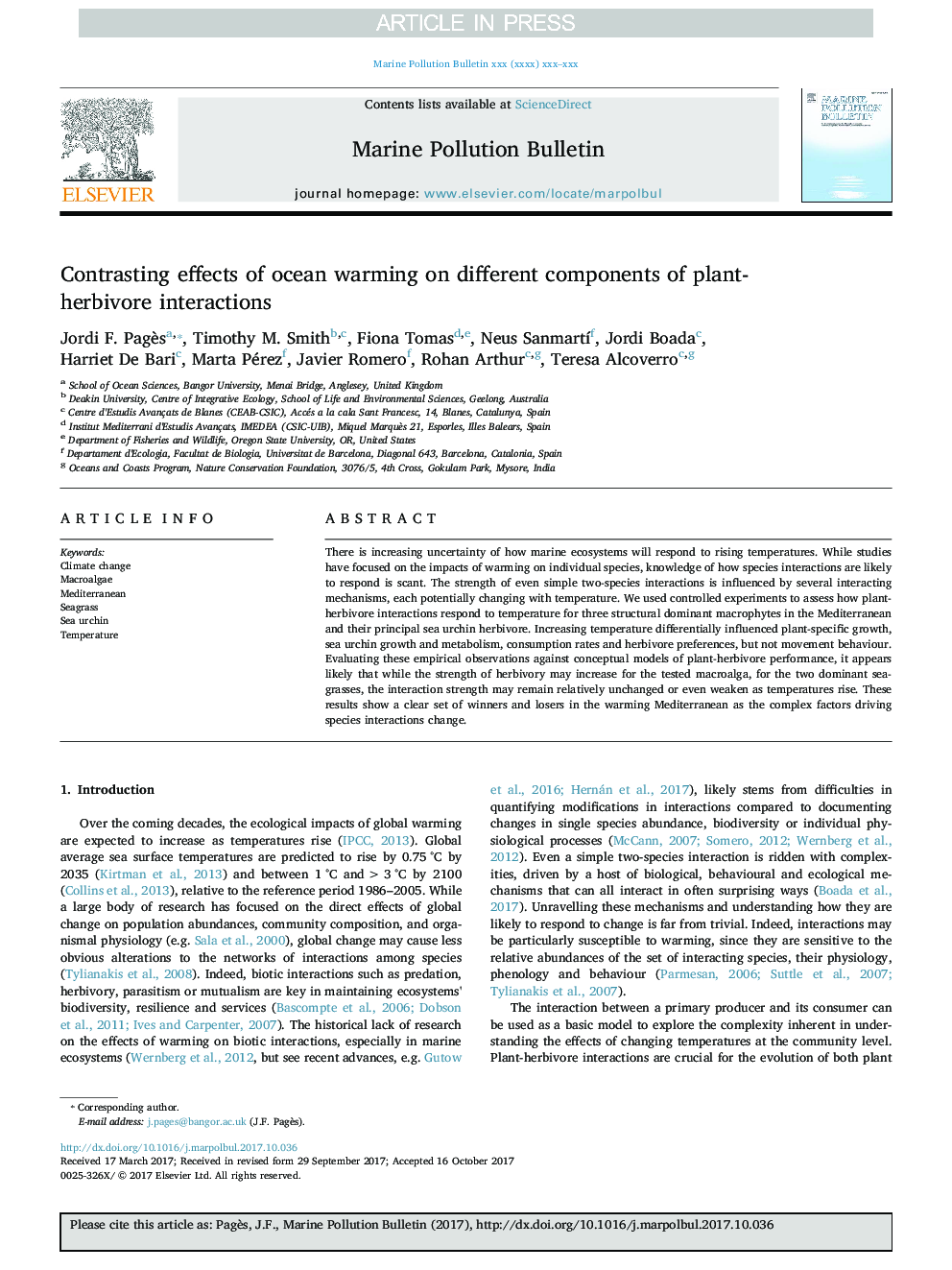| کد مقاله | کد نشریه | سال انتشار | مقاله انگلیسی | نسخه تمام متن |
|---|---|---|---|---|
| 10223659 | 1701042 | 2018 | 11 صفحه PDF | دانلود رایگان |
عنوان انگلیسی مقاله ISI
Contrasting effects of ocean warming on different components of plant-herbivore interactions
ترجمه فارسی عنوان
اثرات متقابل گرم شدن اقیانوس بر اجزای مختلف اثر متقابل گیاهان و گیاهان
دانلود مقاله + سفارش ترجمه
دانلود مقاله ISI انگلیسی
رایگان برای ایرانیان
کلمات کلیدی
ترجمه چکیده
عدم اطمینان بیشتری در مورد اینکه چگونه اکوسیستم های دریایی به دماهای افزایش می یابند، وجود دارد. در حالی که مطالعات بر تاثیرات گرمایش بر روی گونه های فردی متمرکز شده اند، شناخت این که چگونه واکنش های گونه ها احتمالا واکنش کمتری دارند. قدرت متابولیسم ساده دو گونه تحت تأثیر چندین مکانیسم تعامل است که هر کدام به طور بالقوه با دمای تغییر می کنند. ما از آزمایش های کنترل شده برای ارزیابی نحوه تعامل گیاهان و گیاهان به دما برای سه ماکروفیت غالب تشکیل دهنده در مدیترانه و گیاهخواران اصلی آنها استفاده کردیم. افزایش درجه حرارت به طور متفاوتی تحت تاثیر رشد گیاه، رشد قارچ دریایی و متابولیسم، میزان مصرف و ترجیحات گیاه خوار قرار گرفت، اما رفتار جنبش نیست. به منظور ارزیابی این مشاهدات تجربی بر روی مدل های مفهومی عملکرد گیاهان دارویی، به نظر می رسد احتمال وجود دارد که درحالی که ممکن است سبب افزایش گیاهانی برای ماکروالگا مورد آزمایش برای دو جلبک دریایی غالب، مقاومت متقابل، به دلیل افزایش دما، نسبتا بدون تغییر یا حتی تضعیف شود. این نتایج نشان می دهد مجموعه ای روشن از برندگان و بازندگان در گرم شدن مدیترانه به عنوان عوامل پیچیده تعاملی گونه های تغییر تغییر می کند.
موضوعات مرتبط
مهندسی و علوم پایه
علوم زمین و سیارات
اقیانوس شناسی
چکیده انگلیسی
There is increasing uncertainty of how marine ecosystems will respond to rising temperatures. While studies have focused on the impacts of warming on individual species, knowledge of how species interactions are likely to respond is scant. The strength of even simple two-species interactions is influenced by several interacting mechanisms, each potentially changing with temperature. We used controlled experiments to assess how plant-herbivore interactions respond to temperature for three structural dominant macrophytes in the Mediterranean and their principal sea urchin herbivore. Increasing temperature differentially influenced plant-specific growth, sea urchin growth and metabolism, consumption rates and herbivore preferences, but not movement behaviour. Evaluating these empirical observations against conceptual models of plant-herbivore performance, it appears likely that while the strength of herbivory may increase for the tested macroalga, for the two dominant seagrasses, the interaction strength may remain relatively unchanged or even weaken as temperatures rise. These results show a clear set of winners and losers in the warming Mediterranean as the complex factors driving species interactions change.
ناشر
Database: Elsevier - ScienceDirect (ساینس دایرکت)
Journal: Marine Pollution Bulletin - Volume 134, September 2018, Pages 55-65
Journal: Marine Pollution Bulletin - Volume 134, September 2018, Pages 55-65
نویسندگان
Jordi F. Pagès, Timothy M. Smith, Fiona Tomas, Neus SanmartÃ, Jordi Boada, Harriet De Bari, Marta Pérez, Javier Romero, Rohan Arthur, Teresa Alcoverro,
